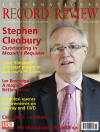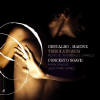Texte paru dans: / Appeared in:
*

International Record Review - (06/2013)
Pour
s'abonner / Subscription information
ZigZag
ZZT319
(2CD)

All the ingredients are here for something truly special. Jean-Marc Aymes has over the past few years been responsible for many magnificent recordings of early Baroque vocal repertoire — either as harpsichord soloist or as director of Concerto Soave in the company of co-founder Maria Cristina Kiehr. One does not have to be too long in the tooth to recall a time when the seeming inescapables of vibrato, massed voices or both made performances of Gesualdo even in something approximating equal temperament a rarity the last couple of decades have brought more and more singers capable of rendering these tortuous harmonics with ringing purity.
As Aymes’s booklet note reminds us, these works were in any case not composed for equal temperament but for something rather more varied: a disc I reviewed in May 2006, the Raumklang release entitled ‘La Tavola Cromatica’ from The Earle His Viols, revealed (in mostly instrumental garb) how much more these harmonics have to say in the enharmonic temperaments favoured by Gesualdo’s circle, whetting the 1istener’s appetite for singers able and willing to tackle the thorny task of rendering this music vocally in the harmonic vocabulary for which it was conceived. Here Kiehr is joined by a fine cast of madrigalists, not least the bass Daniele Carnovich, a member of La Compagnia dcl Madrigale for its recent (and magnificent) survey on Glossa of Gesualdo’s Sesto Libro di Madrigcili (reviewed in April by Andrew O’Connor). The collection is augmented by instrumental works from Gesualdo’s contemporary Ascanio Maione (many of them for the chromatic harp, on which he was a noted virtuoso), providing a welcome and necessary relief from Gesualdo’s hot-house atmosphere.
The result, although fine listening, proves to be a little less than the sum of its promising parts. It is an unfortunate reality that the timing aimed at by Concerto Soave does not allow for the slightest imprecision in vocal delivery — not all these singers are possessed of Kiehr’s clarity and even the modest amount of vibrato employed is sufficient to blur the tuning. (Is it even possible for voices to achieve the degree of clarity enjoyed by The Earle His Viols on their tribute to enharmonicism? One must surely hope so.) There also seems to be a reluctance to bend the metre to allow these harmonics to speak and as a result some of Gesualdo’s harmonic audacities pass by without having a chance to settle in the car. One can certainly understand this unwillingness to let dramatic considerations override the purity of their delivery. It is hard, though, not to concede that these performances are not as compelling as they might have been with just a little more of a nod towards the demands of rhetoric and a more unanimous sense of narrative, especially as these qualities do appear from time to time — the passage ‘Miserere mei, Deus, et salva me’ in the motet Peccantem me quotidie sees the singers making a more persuasive case for Gesualdo’s harmonic wanderings.
Whihe Mara Gaiassi’s triple harp is in principle aptly suited for playing these ‘enharmonic’ harmonics, it is sometimes so resonant that the harmonic outlines become blurred — whether the close recording is to blame or whether a little judicious damping might have improved the result is hard to say. The pick of her solos is surely the opener for the second disc, Mayone’s Toccata Quinta - designated for the ‘cimbalo cromatico’ and not only virtuosic but extremely effective in Galassi’s hands. The Sixth Book of Madrigals (above all the notorious Moro, lasso al mio duolo) make for a revealing comparison between the Concerto Soave disc and the new Glossa recording with La Compagnia del Madrigale sharing two singers, the tenor Raffaele Giordani and the aforementioned Carnovich. The Glossa disc features a much more unified vocal ensemble, both dramatically and timbrally, the latter aided by a more realistic distance in the recorded perspective. It may not quite bring out the finer points of enharmonic tuning but it must be admitted that despite the best of intentions neither does the Concerto Soave recording. The instruments are no match in dynamic here for the voices and reach the listening ear more as background (or even distraction) than support, sometimes with slight but intonational disagreements. (Is it possible that the singers have not fully embraced the presence of their instrumentalist colleagues? The opening of Moro, lasso suggests as much, the voices phrasing much as they might have in an a cappella rendition.)
While
there is much to enjoy here, it is less than one might fairly have expected
from these artists in this repertoire — we have hopefully not heard the last
of what this line of approach has to offer.
Fermer la fenêtre/Close window
Cliquez l'un ou l'autre
bouton pour découvrir bien d'autres critiques de CD
Click either button for many other reviews


